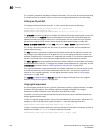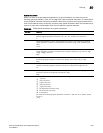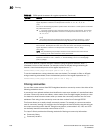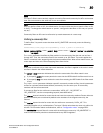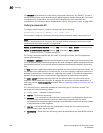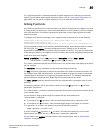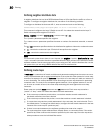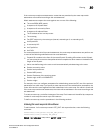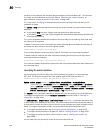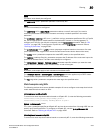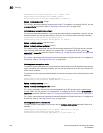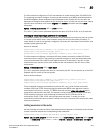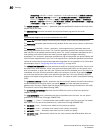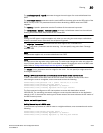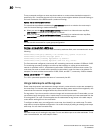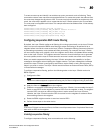
1044 PowerConnect B-Series FCX Configuration Guide
53-1002266-01
Filtering
30
As shown in this example, the command prompt changes to the Route Map level. You can enter
the match and set statements at this level. Refer to “Specifying the match conditions” on
page 1044 and “Setting parameters in the routes” on page 1047.
The <map-name> is a string of characters that names the map. Map names can be up to 32
characters in length.
The permit | deny parameter specifies the action the router will take if a route matches a match
statement.
• If you specify deny, the Layer 3 Switch does not advertise or learn the route.
• If you specify permit, the Layer 3 Switch applies the match and set statements associated with
this route map instance.
The <num> parameter specifies the instance of the route map you are defining. Each route map
can have up to 50 instances.
To delete a route map, enter a command such as the following. When you delete a route map, all
the permit and deny entries in the route map are deleted.
PowerConnect(config)#no route-map Map1
This command deletes a route map named “Map1”. All entries in the route map are deleted.
To delete a specific instance of a route map without deleting the rest of the route map, enter a
command such as the following.
PowerConnect(config)#no route-map Map1 permit 10
This command deletes the specified instance from the route map but leaves the other instances of
the route map intact.
Specifying the match conditions
Use the following command to define the match conditions for instance 1 of the route map
GET_ONE. This instance compares the route updates against BGP4 address filter 11.
PowerConnect(config-routemap GET_ONE)#match address-filters 11
Syntax: match [as-path <num>] | [address-filters | as-path-filters | community-filters
<num,num,...>] | [community <num>] | [community <ACL> exact-match] | [ip address
<ACL> | prefix-list <string>] | [ip route-source <ACL> | prefix <name>] [metric <num>] |
[next-hop <address-filter-list>] | [nlri multicast | unicast | multicast unicast] | [route-type
internal | external-type1 | external-type2] | [tag <tag-value>]
The as-path <num> parameter specifies an AS-path ACL. You can specify up to five AS-path ACLs.
To configure an AS-path ACL, use the ip as-path access-list
command. Refer to “Defining an
AS-path ACL” on page 1036.
The address-filters | as-path-filters | community-filters <num,num,...> parameter specifies a filter
or list of filters to be matched for each route. The router treats the first match as the best match. If
a route does not match any filter in the list, then the router considers the match condition to have
failed. To configure these types of filters, use commands at the BGP configuration level:
• To configure an address filter, refer to “Filtering specific IP addresses” on page 1033.
• To configure an AS-path filter or AS-path ACL, refer to “Filtering AS-paths” on page 1035.
• To configure a community filter or community ACL, refer to “Filtering communities” on
page 1038.
You can enter up to six community names on the same command line.



